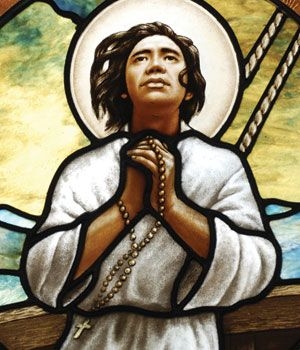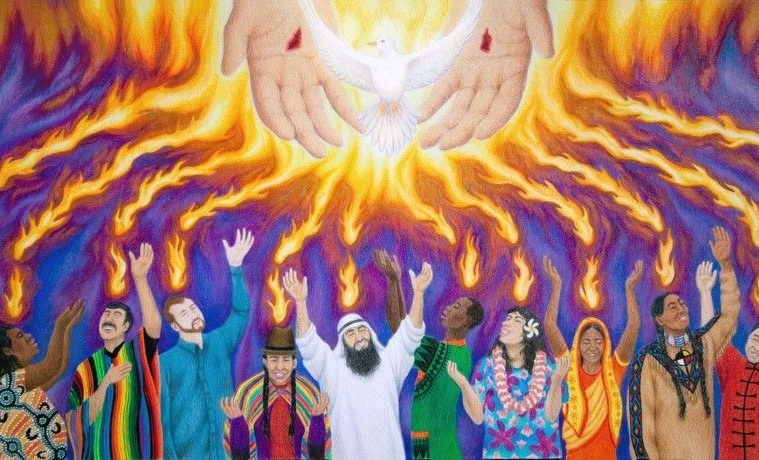These reflections are a result of more than 40 years of ministry as a Roman Catholic priest. Most of these years I spent in the Diocese of Charlotte which covers Western North Carolina. Now I am retired, and live in Medellín, Colombia where I continue to serve as a priest in the Archdiocese of Medellín.

Responsorial Psalm (Psalm 138)
R. In the sight of the angels I will sing your praises, Lord.
I will give thanks to you, O LORD, with all my heart,
for you have heard the words of my mouth;
in the presence of the angels I will sing your praise; I will worship at your holy temple
and give thanks to your name.
R. In the sight of the angels I will sing your praises, Lord.
In the Divine Liturgy of Saint John Chrysostom we learn that in the celebration of the Eucharist we are like the angels in that we represent the Cherubim and we sing the song of the Seraphim, who sing Holy, Holy, Holy:
Let us, who mystically represent the Cherubim and who sing the thrice-holy hymn to the life-creating Trinity, now lay aside every worldly care. So that we may receive the King of all . . . Who is invisibly escorted by the angelic hosts. Alleluia. Alleluia. Alleluia.

Thus says the LORD of hosts:
In those days ten men of every nationality,
speaking different tongues, shall take hold,
yes, take hold of every Jew by the edge of his garment and say,
“Let us go with you, for we have heard that God is with you.” (Zec 8:20-23)
Imagine the surprise . . . a complete stranger, a foreigner at that, comes up to you on the street, grabs you and says, “Hey, I hear God is with you. Can I join?” Today is the feast of Lawrence Ruiz (the first canonized Phillipine saint) and his companions, missionary martyrs to Japan.

Thus says the LORD of hosts:
Lo, I will rescue my people from the land of the rising sun,
and from the land of the setting sun.
I will bring them back to dwell within Jerusalem.
They shall be my people, and I will be their God,
with faithfulness and justice. (Zec 8:1-8)
No one saint has inspired the church to work for justice like Saint Vincent de Paul. As the Scriptures remind us, working for justice is an essential part of faith because our God comes with faithfulness and justice. As Saint Vincent de Paul said, “There is no Charity without Justice.”

The LORD came down in the cloud and spoke to Moses. Taking some of the spirit that was on Moses, the LORD bestowed it on the seventy elders; and as the spirit came to rest on them, they prophesied. Moses said, "Would that all the people of the LORD were prophets! Would that the LORD might bestow his spirit on them all!" (Num 11:25-29)
God’s Spirit is generously given. The Spirit fills the earth and us too. Most of us do not think of ourselves as prophets, and so Saint Paul has some good advice for us, “Do not quench the Spirit” (1 Thes 5:19). Perhaps we need to pay attention to that old prayer to the Holy Spirit:
Come, Holy Spirit,
fill the hearts of your faithful
and kindle in us the fire of your love.
Send forth your Spirit and we shall be created.
And you shall renew the face of the earth.

Responsorial Psalm (Jer 31:10,11-12ab,13)
R. The Lord will guard us as a shepherd guards his flock.
Hear the word of the LORD, O nations, proclaim it on distant isles, and say: He who scattered Israel, now gathers them together, he guards them as a shepherd guards his flock.
R. The Lord will guard us as a shepherd guards his flock.
Then the virgins shall make merry and dance, and young men and old as well. I will turn their mourning into joy, I will console and gladden them after their sorrows.
R. The Lord will guard us as a shepherd guards his flock.
When we are devastated and depressed, we feel that we will never be happy again. But God has other plans . . . to turn our mourning into joy. Why don’t they ever talk about making merry and dancing when they talk about heaven. We certainly could use some good news for a change! Well, the prophet reminds us that the Lord guards us as a shepherd guards his flock. “O nations, hear the word of the Lord!”



